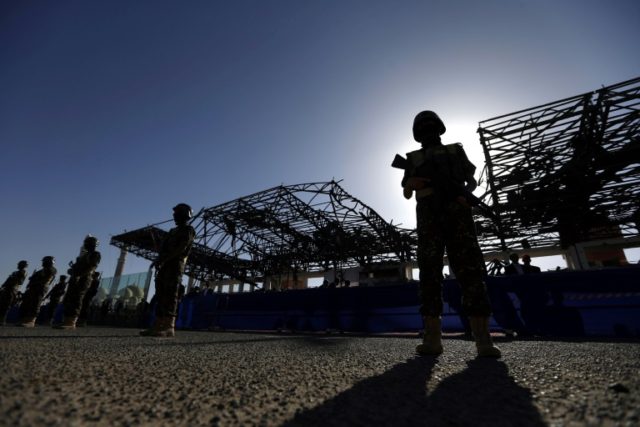Yemeni President Abd-Rabbu Mansour Hadi, during his speech before the United Nations General Assembly on Wednesday, accused state-sponsor of terrorism Iran of trafficking illegal drugs into Yemen to fund the its proxy Houthi rebels.
Hadi declared:
Iran carries out blatant interventions in Yemen. It finances the Houthi militias — provides it with weapons, missile equipment, and experts. It targets international and regional waters as well as jeopardizing international shipping routes. It also carries out a policy consisting of overwhelming us with drugs and with [the] illicit trafficking of drugs it supports [Houthi-linked] terrorism.
Hadi’s remarks are consistent with recent assertions by Col. Turki Al-Maliki, a spokesman for the Saudi-led Sunni Arab coalition fighting the Shiite insurgents in Yemen, who said that the Houthis are benefitting from the illicit drug trade.
Early this month, the spokesman told reporters in the Saudi capital of Riyadh, “Houthi militias have been trafficking drugs, which the Yemeni security forces with the support of the coalition have been fighting to stop,” Arab News reported.
Citing the seizure of drug shipments that had the slogan “Beirut Youth Council,” Col. Al-Maliki noted, “This explains the relationship between Hezbollah and the Houthi militias in an effort to find sources of funding for military operations.”
In August 2017, a senior Iranian official admitted to Reuters on condition of anonymity that Tehran-linked traffickers are bringing drugs into Yemen to fund the Houthis.
“Parts of missiles, launchers, and drugs are smuggled into Yemen via Kuwaiti waters,” the Iranian official told Reuters. “The route sometimes is used for transferring cash as well.”
“Cash and drugs can be used to fund Houthi activities, the official added.
Throughout his speech at the U.N. General Assembly in New York, President Hadi accused Iran and its narco-terrorist proxy Hezbollah of lending support to the Houthis.
Although Hadi and the Saudi military spokesman did not explicitly identify the narcotics smuggled into Yemen, the U.S. has determined Hezbollah is heavily involved in trafficking cocaine from Latin America, an accusation that the Shiite group denies.
Moreover, Saudi authorities seized hashish and heroin originating from Yemen in March. Saudi Arabia and Yemen share a border, the National newspaper from the United Arab Emirates revealed.
Hadi described the Houthis as Islamic “extremists” on Wednesday, adding, “They employ gangster-like tactics such as blowing up houses, places of worship, and planting mines in an unprecedented, reckless manner. They recruit children by force. They collect funds and remittances by force. They have confiscated our liberties and right.”
On Monday, Lise Grande, the U.N.’s resident and humanitarian coordinator in Yemen, said that the international body has documented “more than 2,600” cases of child recruitment.
She acknowledged that the war in Yemen, which has been raging since March 2015, has killed at least 16,000 people, stressing, “The real number, of course, is almost certainly far higher.”
Hadi stressed that the U.N. should pressure Iran to stop backing the Houthis and focus on defeating the Shiite rebels, noting that “all attempts of peace” negotiations “are doomed to fail.”
According to the U.N., “Some 22.2 million people, including 2 million internally displaced people and 1 million returnees require humanitarian aid or protection in Yemen,” home to the world’s worst humanitarian crisis fueled by hunger and disease.
In March 2015, a Saudi-led Sunni alliance and fighters loyal to Hadi launched an ongoing offensive against the Houthi rebels to recapture the Yemeni capital of Sanaa and restore the country’s president to power.
Soon after Sanaa fell to the Houthis, Hadi fled to Saudi Arabia but returned to Yemen in November 2015 after six-months in exile.
The Houthis still hold Sanaa, forcing the Hadi government to rule from the southern port city of Aden.

COMMENTS
Please let us know if you're having issues with commenting.